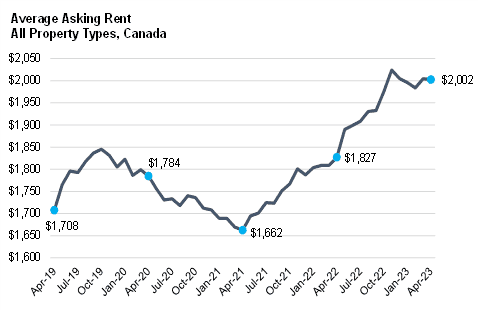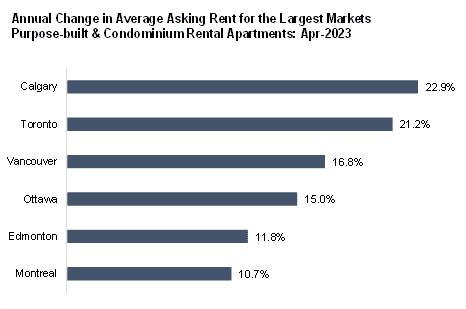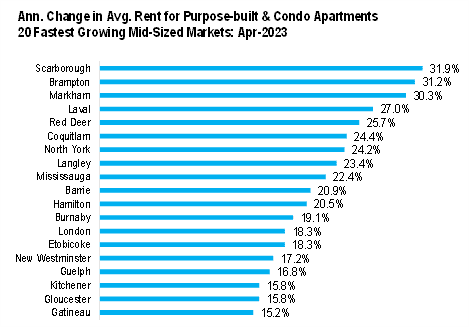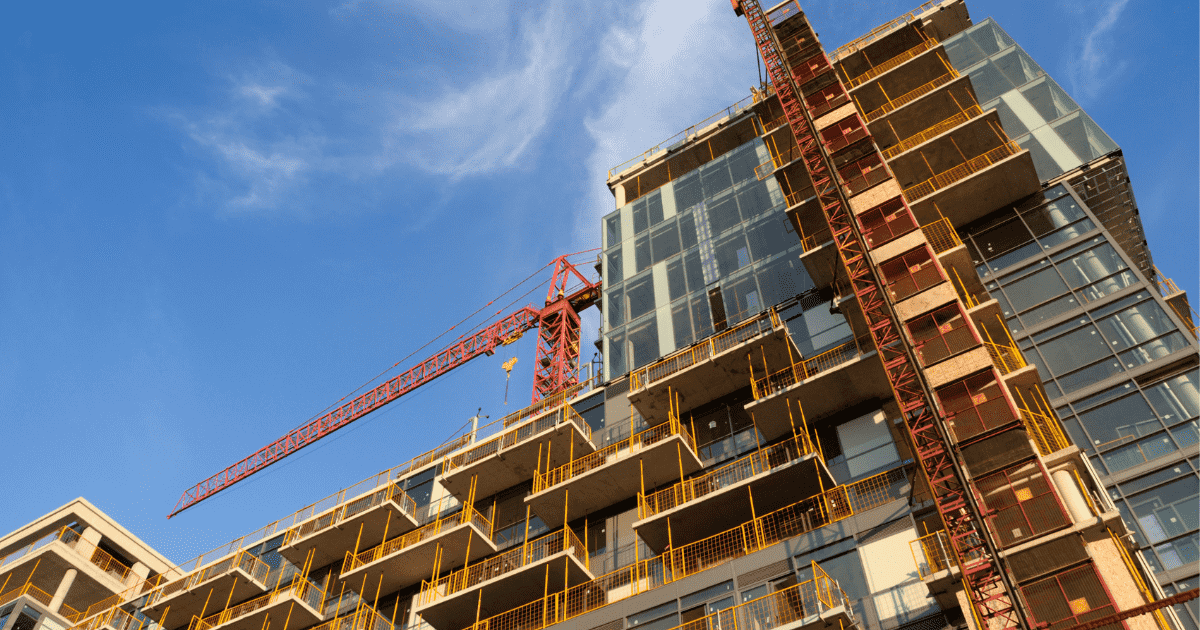Average asking rents in Canada experienced a significant increase of 20 per cent in April, reaching $2,002 for all property types. This surge comes in comparison to the pandemic low recorded in April 2021 at $1,662, according to the latest National Rent Report from Rentals.ca and Urbanation.
The rise in rents translates to an average monthly increase of $340. While average rents were up by 9.6 per cent compared to April 2022 ($1,827), they remained unchanged from March ($2,004).
Demand-driven increases expected in the coming months
The report suggests that average asking rents are likely to continue increasing in the coming months due to high demand from Canada’s growing population. Additionally, more tenants are choosing to remain in the rental market due to the high cost of homes and elevated interest rates.
However, the year-over-year percentage increases are expected to stabilize as the country and the rental market recover from the effects of the pandemic in the previous year.
Shaun Hildebrand, president of Urbanation, noted that the strongest rent growth is occurring in markets that experience high levels of immigration.
“Tenants that signed leases during the pandemic may be facing rent increases of 20 per cent or more if they decide to move, causing reduced turnover that is exacerbating the low supply situation,” Hildebrand adds.
Matt Danison, CEO of Rentals.ca, points out that Canadians have become accustomed to increasing rents in the post-pandemic period. Danison says, “Record immigration with most newcomers renting, high interest rates keeping first-time home buyers on the sidelines, and inflation are all drivers of rising rents, increasing demand and low vacancy rates.”

(Unsurprisingly) Vancouver and Toronto remain most expensive cities to rent in
As expected, Vancouver and Toronto remain Canada’s most expensive rental markets. Vancouver topped the list of 35 cities, with average monthly rents of $2,787 for a one-bedroom home and $3,741 for a two-bedroom in April. Compared to the previous year, the average monthly rent for a one-bedroom in Vancouver increased by 14.7 per cent, and for a two-bedroom, it rose by 17.6 per cent.
Toronto secured the second position on the list, with average monthly rents of $2,526 for a one-bedroom and $3,290 for a two-bedroom in April. Year-over-year, the average monthly rent for a one-bedroom in Toronto increased by 20.5 per cent, and for a two-bedroom, it rose by 18 per cent.
In April, average rents in Vancouver and Toronto increased 47 per cent and 41 per cent for condo rentals and apartments compared to the pandemic low in April 2021.
Montreal ranked 25th on the list for average monthly rent in April, with prices at $1,655 for a one-bedroom home and $2,169 for a two-bedroom. The city experienced year-over-year increases of 10.7 per cent for a one-bedroom and 11.2 per cent for a two-bedroom.
Calgary leads in increasing average rents for apartments and condos
For the third consecutive month, Calgary topped the list of Canada’s major cities for increasing average rents for purpose-built and condominium apartments.
In April, average rents in Calgary rose by 22.9 per cent compared to the previous year, reaching $1,924. Toronto followed closely in second place, with average monthly rents increasing by 21.2 per cent to $2,822 for condo rentals and apartments. Vancouver, the highest-priced major market for renters, witnessed a 16.8 per cent increase in April to reach an average monthly rent of $3,236.
Other cities also experienced notable rent increases—Ottawa saw average rents rise by 15 per cent for condo rentals and apartments, while Edmonton recorded an 11.8 per cent increase. Montreal’s average rents rose by 10.7 per cent.

Medium-sized Ontario cities witness fastest year-over-year rent increases
The report highlighted that 12 medium-sized cities in Ontario experienced the fastest rent increases for condos and apartments compared to the previous year.
Topping the list were Scarborough, Brampton and Markham, with average rent increases exceeding 30 per cent year-over-year. These rental markets have been notably impacted by high levels of immigration, according to the report.
Following closely behind were cities like Laval, Que. (27 per cent), Red Deer, Alta. (25.7 per cent), Coquitlam, B.C. (24.4 per cent), North York, Ont. (24.2 per cent), and Langley, B.C. (23.4 per cent).
Other cities on the list with notable annual average rent increases for condos and apartments in April included Mississauga, Ont. (22.4 per cent), Barrie, Ont. (20.9 per cent), and Hamilton, Ont. (20.5 per cent).
Burnaby, B.C. (19.1 per cent), London, Ont. (18.3 per cent), Etobicoke, Ont. (18.3 per cent), New Westminster, B.C. (17.2 per cent), Guelph, Ont. (16.8 per cent), Kitchener, Ont. (15.8 per cent), Gloucester, Ont. (15.8 per cent), and Gatineau, Que. (15.2 per cent) also experienced double-digit rent growth.
Among medium-sized markets, Oakville, Ont. emerged as the most expensive in Canada for condo rentals and apartments, with average monthly rents reaching $3,413. Burnaby, B.C. ($2,894), Coquitlam, B.C.($2,788), and Richmond, B.C. ($2,723) followed as the next three most expensive medium-sized cities.
Halifax was the only non-Ontario and non-British Columbia city in the top 25 most expensive, with average monthly rents at $1,999.

Provincial rent increases
Provincially, Ontario and British Columbia saw the highest average monthly rent increases for condos and apartments compared to the pandemic low in April 2021.
Ontario experienced a substantial increase of 29 per cent, while B.C. followed closely at 28 per cent.
In Ontario, the average rent for purpose-built and condominium apartments rose by 16.7 per cent to $2,421. Alberta secured the second position with a 14.8 per cent increase, reaching an average monthly rent of $1,500.
Meanwhile, B.C. recorded the lowest average rent increase at 5.6 per cent for condo rentals and apartments but maintained the highest average rent at $2,468.
Quebec saw an 11 per cent increase in average rent, reaching $1,850 in April.















